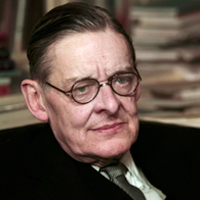Eliot's The Love Song of J. Alfred Prufrock as a Dramatic Monologue
'The Love Song of J Alfred Prufrock' by T. S. Eliot has been described as a dramatic monologue because it is an attempt at self-expression by a sentimental middle aged gentleman over the teacups. It is dramatic in the sense that it shows us the personality of Prufrock and not of the poet. It is a monologue because in this poem only one character does all the talking from beginning to end. In this sense it is a dramatic monologue. In a dramatic monologue the presence of a silent listener or listeners is implied.

T. S. Eliot (1888-1965)
In The Love Song the monologue may be taken as an address to you who as Eliot himself says, 'is a companion or a beloved'. But if 'you', is taken for another aspect of the same person, it will be more appropriate to call it 'interior monologue.' The interior monologue has been characterized as the speech of a character in a scene, having for its object the direct introduction of the reader into the interior life of a character, without any intervention in the way of explanations of commentary on the part of the author. The Interior monologue aims at portraying the most intimate thought and is not meant for any hearer. That is why the term 'dramatic monologue' may, strictly speaking, be inappropriate for the poem. In a dramatic monologue the presence of the other character or other characters is always felt: one character is speaking to the other, even though the latter may be silent. In this poem Prufrock is more speaking to himself, in fact, all the time speaking to himself. It would, therefore, be more appropriate to call the poem as 'interior monologue' than a 'dramatic monologue.'
Prufrock is a neurotic character and his love-song, which will never be uttered, outside the inferno of his own mind, is a monologue of a man of abnormal sensibility. He is the center of the poem and what passes within his consciousness is the warp and woof of the poem. The poem is concerned with the self-revelation of Prufrock who is a neurotic person. He is going to a sophisticated party, apparently a ladies' occasion of a cultural kind. He has a special mission, for he is in love with one of the ladies and is going to declare it. But he is an irresolute person for whom the simplest decision is a matter of strain, speculation and distress. The various images such as those of the evening 'like a patient etherized upon a table', the yellow fog likened to a cat, and Prufrock's own conception of himself as a worm 'pinned and wriggling on the wall' reveal his indecision, despair and passivity. As we descend deeper into his consciousness, the past and the present are fused and merged. The triviality of his past experiences is suggested by images like 'I have measured out my life with coffee-spoons' and 'the butt-ends of my days and ways.' His romantic past is suggested by the lines, 'And I have known the arms already, known them all/Arms That are braceleted and white and bare'. This is contrasted with his that misfortune and physical decay.
Prufrock is a tragic figure. His tragedy is that of a man who is unable to commit himself to any faith that would sustain him. His tragedy is a dual one: Prufrock is in love, and just as ethically he cannot bring himself to propose to his lady. He is conscious of his own growing age, his bald head, and his impotence. That is why he does not 'dare disturb the universe'. His spiritual distress, his helplessness and despair are pointed out as the characteristics of modern life with its sick hurry and divided aims. At the same time his tragedy is 'at the heart of life because it is a 'recurrent phase' in human civilization. Thus the portrait of Prufrock is more than that of a particular person or a particular age. Prufrock is the most incisive portrait of a type of individual who represents a phase of diseased civilization, where life has been reduced to an endless succession of trivialities. Prufrock, like other remarkable literary figures, is an individual representing a universal type.
Prufrock represents a split consciousness, a division between heart and head, or, to be precise, a paralysis of heart through over conscious. The desire of the heart failing to find fulfillment in action, begins to feed upon itself, and the emotional impulse to act or to come to a decision is repressed by over scrupulousness. The result is emotional frustration, and self-dissection or self-deprecation. In the case of Prufrock the problem is complicated by the fact that he is smart, but middle-aged man who is naturally more timid in love making than a hot-blooded youth. Prufrock, thus, is unable to make his mind and, prefers dreaming about love and beauty to doing something real and fruitful for securing the love of the woman he desires to possess.
Cite this Page!
Shrestha, Roma. "Eliot's The Love Song of J. Alfred Prufrock as a Dramatic Monologue." BachelorandMaster, 4 Sep. 2017, bachelorandmaster.com/britishandamericanpoetry/the-love-song-as-a-dramatic-monologue.html.
Related Topics
The Love Song of J. Alfred Prufrock: Summary
Use of Irony and Sarcasm in The Love Song...
Objective Correlative in The Love Song...
The Waste Land: Critical Analysis
Journey of the Magi: Summary and Analysis
Morning at the Window: Summary and Analysis
Rhapsody on a Windy Night: Summary and Analysis
Sweeney among the Nightingales: Analysis
The Hollow Men: Critical Analysis
Portrait of a Lady: Summary and Analysis
Thomas Sterne Eliot: Biography
 |
bachelorandmaster.com |